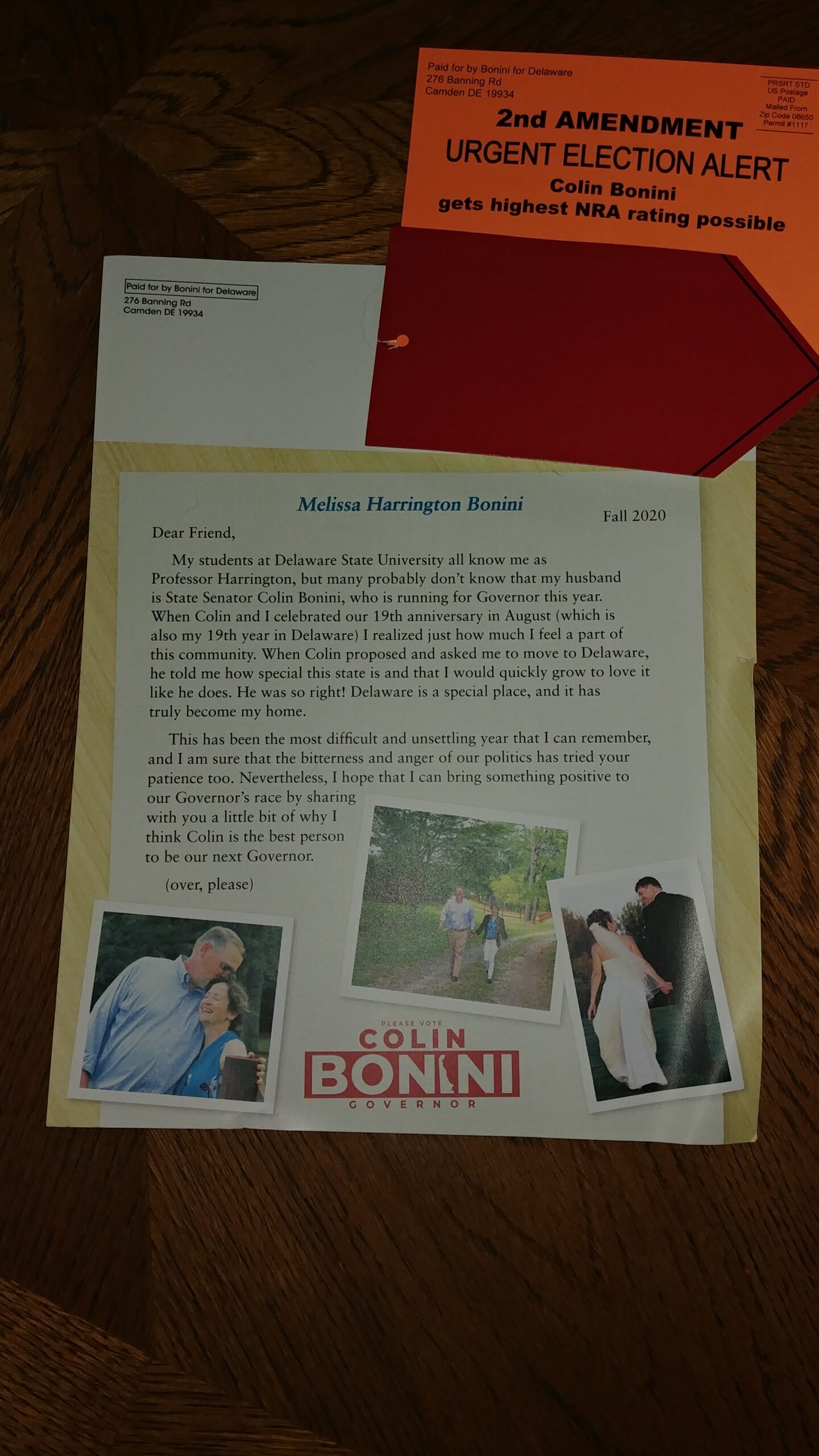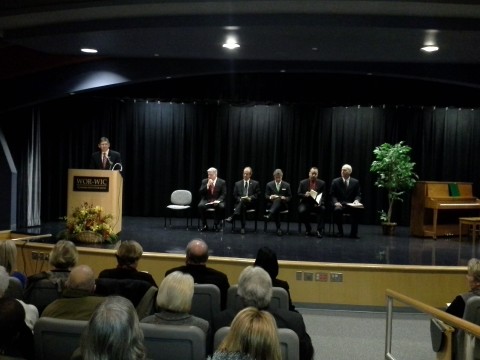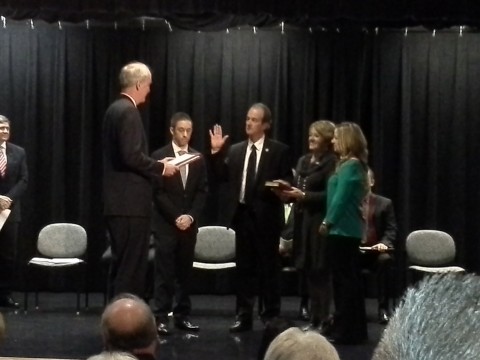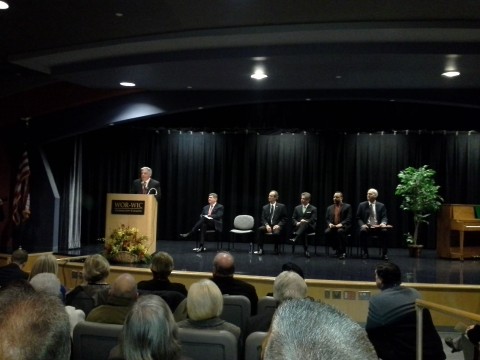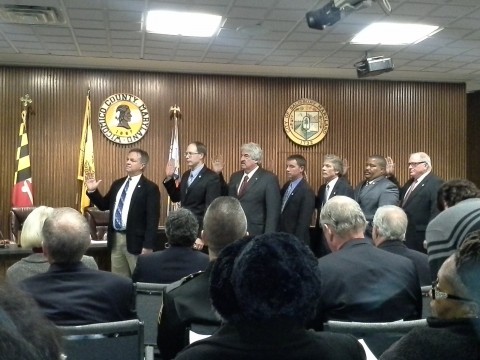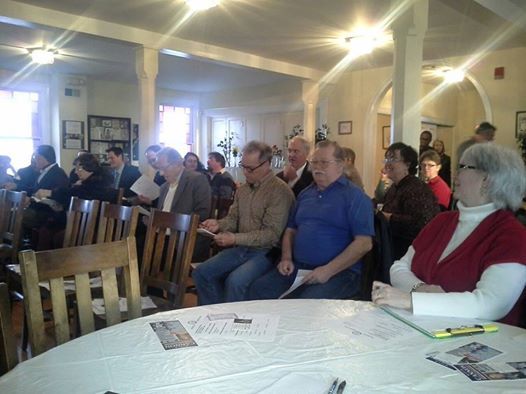Earlier this month I took a look at the financial situation of the various state candidates in Districts 37 and 38, so now I’m going to narrow the focus down to Wicomico County, which has a number of interesting contested races going on – although only a few have much money involved to speak of. No six-figure war chests here.
I’ll begin at the top with the County Executive race, where Bob Culver has an interesting split going on:
- 49 donations from individuals in county for $5,910
- 9 donations from individuals outside of county for $1,175
- 13 donations from businesses in area for $2,300
- 4 donations from businesses outside of area for $6,700
- 2 donations from PACs and other committees for $600
- Average donation: $216.69
- Cash on hand (bank account balance) – $15,398.33
Because of the 2 large donations from Comcast (considered a business outside the area) totaling $4,000, Bob’s numbers are skewed: 49.2% of his money came from inside the area, with a hefty 47.2% coming from outside the area and just 3.6% from PACs and other committees. Out of the 96.4% coming from individuals and businesses, 42.5% was out of individual pockets and 53.9% was from businesses – again, the Comcast donations make up almost 1/4 of Bob’s total take.
Now let’s look at the “independent” challenger Jack Heath:
- 68 donations from individuals in county for $14,825.05
- 10 donations from individuals outside of county for $1,950
- 8 donations from businesses in area for $1,771.76
- No donations from businesses outside of area
- No donations from PACs and other committees
- Average donation: $215.66
- Cash on hand (bank account balance) – $8,897.41
For Jack, 89.5% of his money came from inside the area and 10.5% from outside. Similarly, the heavy preponderance of contributions are from individuals: 90.4% compared to 9.6% from businesses. Heath has raised more money than Culver but his burn rate is faster, too.
Democratic County Executive candidate John Hamilton has filed only ALCEs since opening his campaign, meaning he has raised and/or spent less than $1,000. He’s the first of many candidates who can claim that route, as you’ll see moving forward.
Regarding the quotes around “independent” for Heath: that lack of movement from the elected Democrat has prompted at least one recently-elected member of their Central Committee (who’s also the president of the Wicomico Democratic Club) to resign from the DCC so he and the club could back Heath, while others on the Wicomico DCC (who presumably are club members, too) are more tacit in their support for Jack.
It’s much simpler when it comes to other county-wide races. I’ll hold off on the County Council and school board for the moment to look at the two single-victor races for State’s Attorney and Clerk of the Circuit Court. The two other countywide positions (Register of Wills Karen Lemon and Sheriff Mike Lewis) feature unopposed candidates who have regularly filed ALCEs – Lemon’s streak goes back to 2010.
The State’s Attorney race has the current appointee, Republican Jamie Dykes, running for a full term. Her campaign so far:
- 80 donations from individuals in county for $13,388.25
- 6 donations from an individual outside of county for $1,000
- 11 donations from businesses in area for $4,065.47
- No donations from businesses outside of area
- No donations from PACs and other committees
- Average donation: $189.63
- Cash on hand (bank account balance) – $6,087.33
Jamie received 94.6% of her money from inside the county and 5.4% from outside. Individuals also chipped in the most by far: 77.9% compared to 22.1% from businesses.
Conversely. Democrat Seth Mitchell, who previously ran for the post in 2010, has ceded the financial field to Dykes thus far: Mitchell has filed nothing but ALCEs in his run to date.
The fight has been joined on both sides for the Clerk of Court race, an open seat thanks to the retirement of longtime Clerk Mark Bowen.
For Republican Chris Welch:
- 47 donations from individuals in county for $4,255
- 10 donations from individuals outside of county for $1,030
- 7 donations from businesses in area for $1,566
- 2 donations from businesses outside of area for $408
- No donations from PACs and other committees
- Average donation: $109.98
- Cash on hand (bank account balance) – $4,643.05 – with a $40 loan outstanding.
For Welch, 80.2% of his money came from within Wicomico County and 19.8% from outside; meanwhile, 72.8% of donations came from individuals and 27.2% from businesses – much of that business income was in-kind donations for a raffle Welch must have had.
Turning to Democrat James “Bo” McAllister, he has a very unusual setup:
- 25 donations from individuals in county for $2,865
- 48 donations from individuals outside of county for $7,367.11
- 4 donations from businesses in area for $600
- 1 donations from a business outside of area for $500
- No donations from PACs and other committees
- Average donation: $100.86
- Cash on hand (bank account balance) – $3,268.97, but with loans for $10,190.07 outstanding.
Not only is McAllister heavily in debt, he really has one major benefactor: the Robins family in Ocean City. (Chris Robins is his treasurer.) Between standard donations and in-kind offering, the Robinses have contributed $6,333.91, or nearly 56% of everything taken in. It appears that most of Bo’s early campaigning came out of their pocket, but with a family member as treasurer that seems to be a little cozy.
Now that I have those countywide races out of the way, I’ll shift gears to County Council and begin with the two at-large seats.
As the lone incumbent Republican John Cannon is first up, but he hasn’t been very busy:
- 2 donations from individuals in county for $350
- No donations from individuals outside of county
- 3 donations from businesses in area for $251.68 ($1.68 is interest on the bank account.)
- No donations from a business outside of area
- 1 donation from a PAC for $2,000
- Average donation: $433.61
- Cash on hand (bank account balance) – $10,961.34
The huge Realtor PAC donation completely skewed Cannon’s take: 23.1% of his money came from within Wicomico County and 76.9% from the PAC; because of that bump just 13.5% of donations came from individuals and 9.7% from businesses. (The rounding doesn’t allow it to add up.)
Fellow Republican Julie Brewington is less well off:
- 8 donations from individuals in county for $1,920.49
- 1 donation from an individual outside of county for $300
- No donations from businesses in area
- No donations from businesses outside of area
- No donation from PACs
- Average donation: $246.72
- Cash on hand (bank account balance) – $809.30, with a $1,000 loan outstanding.
For Julie, 86.5% of her donations came from individuals inside the county and 13.5% from outside, with all of it from individuals.
On the Democrat side, former County Council member Bill McCain has the financial advantage to return:
- 43 donations from individuals in county for $5,850
- 1 donation from an individual outside of county for $100
- No donations from businesses in area
- No donations from businesses outside of area
- 1 donation from a PAC for $2,000
- Average donation: $176.67
- Cash on hand (bank account balance) – $4,828.89
McCain has had 73.6% of the 74.8% of his take from individuals come from within Wicomico County – the other 25.2% is the donation from the Realtor PAC (the same group that gave to Cannon.)
Lastly is the second Democrat for the at-large County Council position, Jamaad Gould:
- 16 donations from individuals in county for $952
- 2 donations from individuals outside of county for $110
- 1 donation from a business in area for $10
- No donations from businesses outside of area
- No donation from a PAC
- Average donation: $56.42
- Cash on hand (bank account balance) – $325.85
Jamaad is the first of two sub-$100 average donation candidates, but the only countywide one. Percentage-wise, 89.7% of Gould’s donations come from inside Wicomico County and 99.1% come from individuals. It’s a very local-source campaign.
District races are rather low-key as well. In District 1, Ernest Davis had to survive a primary so he raised money earlier in the cycle.
- 27 donations from individuals in county for $1,085
- 1 donation from an individual outside of county for $20
- 1 donation from a business in area for $250
- No donations from businesses outside of area
- No donations from a PAC
- Average donation: $46.72
- Cash on hand (bank account balance) – $828.00
District 2 is contested: incumbent Republican Marc Kilmer is running for a second term. His totals were very simple:
- 2 donations from individuals in county for $450
- No donations from individuals outside of county
- No donations from a business in area
- No donations from businesses outside of area
- No donations from a PAC
- Average donation: $225.00
- Cash on hand (bank account balance) – $2,198.39
That’s one of the healthier on-hand totals around; however, Marc does have a Democrat opponent who is also fundraising in Alexander Scott:
- 3 donations from individuals in county for $550
- No donations from individuals outside of county
- 2 donations from businesses in area for $800
- No donations from businesses outside of area
- No donations from a PAC
- Average donation: $270.00
- Cash on hand (bank account balance) – $550.00
Both donations from businesses were in-kind, which explains the even $550 balance on Scott’s first report – previously he had filed ALCEs and has reported no spending. (So where did the filing fee come from?) But it works out to 40.7% from individuals and 59.3% from businesses.
The District 3 race features incumbent Republican Larry Dodd, who reported just one donation of $1,000 (from the Realtors PAC) and has an outstanding loan of $100 against a balance of $1,784.91. Some of that will be eaten up by a pending fine to be paid to the state Board of Elections of $160 for late filing – the fourth time this cycle (and third this year) that his campaign has been late. After my experience with Kirkland Hall last time (see updated post here) this is a subject I’m going to get back to for a later post.
However, his Democratic opponent Michele Gregory has filed nothing but ALCEs.
Moving to District 4, which is one of the two open seats on County Council (one at-large is also open) we find Republican Suzanah Cain has these statistics:
- 24 donations from individuals in county for $1,496.16
- 11 donations from individuals outside of county for $625
- No donations from businesses in area
- 1 donation from a business outside of area for $0.28 (a setup fee for an account)
- 2 donations from a PAC for $4,000
- Average donation: $161.09
- Cash on hand (bank account balance) – $703.01
Like her fellow Republican John Cannon, the huge Realtor PAC donation completely skews Cain’s take: 24.4% of her money came from within Wicomico County, 10.2% from outside the county, and 65.3% from the PAC. All but less that 0.1% of that non-PAC cash is from individuals.
For Democrat Josh Hastings, the story is a lot different:
- 68 donations from individuals in county for $4,940
- 27 donations from individuals outside of county for $2,425
- 1 donations from a business in area for $50
- No donations from a business outside of area
- 1 donations from a PAC or other committee for $100
- Average donation: $77.47
- Cash on hand (bank account balance) – $1,512.38
Hastings had 66.4% of his donations come from within the county, 32.3% from outside, and 1.3% from the other committee. 98% was offered from individuals, with 1.3% from the one business.
Finally for County Council, you have the unopposed District 5 Republican Joe Holloway. He loaned his campaign $5,000 and still has $4,975 left after the $25 filing fee.
The other partisan office on the ballot is the Orphan’s Court. Not one of the four candidates have filed anything but an ALCE – as expected in a bottom-ballot race for which the Republicans have seldom filled the slots. (All three incumbents are Democrats; however, one lost in the primary.)
Now for the Board of Education. These non-partisan slots are being filled as follows:
- At-large candidates: 2 from a group including Tyrone Cooper, Don Fitzgerald, Michael Murray, and Talana Watson
- District 1: Michelle Bradley or Allen Brown
- District 2: Gene Malone
- District 3: David Goslee, Sr. or William Turner
- District 4: David Plotts or Ann Suthowski
- District 5: John Palmer
Out of that group Cooper, Murray, Malone, Turner, and Palmer reported no contributions. Malone loaned himself $100 so that’s his balance.
Fitzgerald reported $1,400 in contributions (all from the candidate and his treasurer) and has $212.12 on hand.
Watson reported $1,000 in contributions from 2 local businesses and loaned her campaign $1,000 with $909.51 available.
Bradley reported $150 in contributions, one $100 from an individual in the county and $50 from one outside. She still has the $150 left.
Brown reported $860 in contributions, all but 2 of the 13 from individuals within the county and accounting for $660 of the take. He has a balance of $25.
Goslee had the biggest stake among the district aspirants, receiving $1,650 from 4 local individuals – however, $1,100 was from his own personal funds. $586.80 is the largest war chest among the remaining district candidates.
Twelve people have given $706.96 to the Plotts campaign, which includes in-kind donations. (One who donated $25 was from outside the county.) His balance is $187.45.
Suthowski was the second-biggest beneficiary with $1,500 from 13 local individuals (including $400 of her own.) She has $376.46 to play with.
I sort of suspect the real money in the school board race is going to be revealed on the post-election report since the Wicomico County Education Association has yet to be heard from and they’ll certainly have a preferred slate.
That brings this look at finance to a close. But I have a little more research to do after seeing the Kirkland Hall and Larry Dodd debacles. Is it really that hard to do campaign finance reports on a timely basis?

